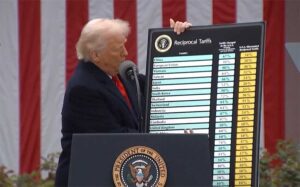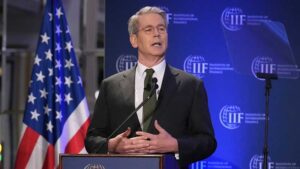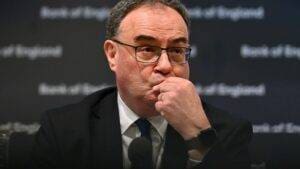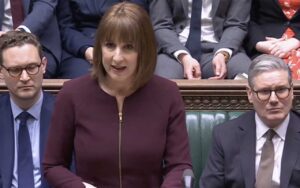A sweeping escalation in US trade tariffs has sent shockwaves through the global economy, with economists warning that the UK, the European Union, and a number of Asian economies could slide into recession this year.
President Trump has raised tariffs on imports from 60 countries, lifting the average US tariff rate from 2.5 per cent to 25.1 per cent — the highest level in more than a century, according to investment bank UBS. The unprecedented move has prompted analysts to drastically revise down global growth forecasts and raise inflation projections.
Barclays said the UK, which faces a baseline 10 per cent tariff on all exports to the US, could see a 1.5 percentage point hit to GDP in 2025. That would tip the economy into recession, derailing an already fragile recovery. The Office for Budget Responsibility had previously forecast 1 per cent growth this year.
While the UK avoided the steepest tariffs — such as the 50 to 70 per cent levies applied to China — the cumulative effect of targeted duties on cars, steel, and broader global supply chain disruption is expected to weigh heavily on British exports and business confidence.
The EU has been hit with additional 20 per cent tariffs, which Barclays estimates could wipe out 1.9 percentage points of GDP growth, while neighbouring Asian economies such as Vietnam and Cambodia have been caught in the crossfire with high punitive levies.
Credit ratings agency Fitch warned that if tariffs remain in place for an extended period, “many countries will likely end up in a recession. You can throw most forecasts out the door.”
China, the biggest single target, is now facing a total US tariff burden of around 70 per cent, with growth projected to fall by up to 1 percentage point, according to Capital Economics. The market is closely watching how Beijing responds, with analysts anticipating fresh stimulus measures to soften the blow.
For the US itself, the effects will be mixed. While the new tariffs are likely to lift inflation — with Oxford Economics forecasting core inflation to approach 4 per cent this year — they are also expected to dampen growth, reducing it from 2 per cent to just 1 per cent of GDP.
Analysts at Nomura now expect the Federal Reserve to make three interest rate cuts within the next 12 months, a reversal from previous expectations of no cuts until mid-2026.
Tariffs, as border taxes, are typically passed on to consumers, raising prices and eroding real incomes. As inflation rises and trade volumes shrink, global supply chains are bracing for a prolonged period of disruption.
For businesses in the UK, particularly exporters in the manufacturing and automotive sectors, the new trade environment presents a major risk. Economists warn that reliance on US markets may now require urgent reassessment, as companies face the twin pressures of reduced competitiveness and falling demand.






